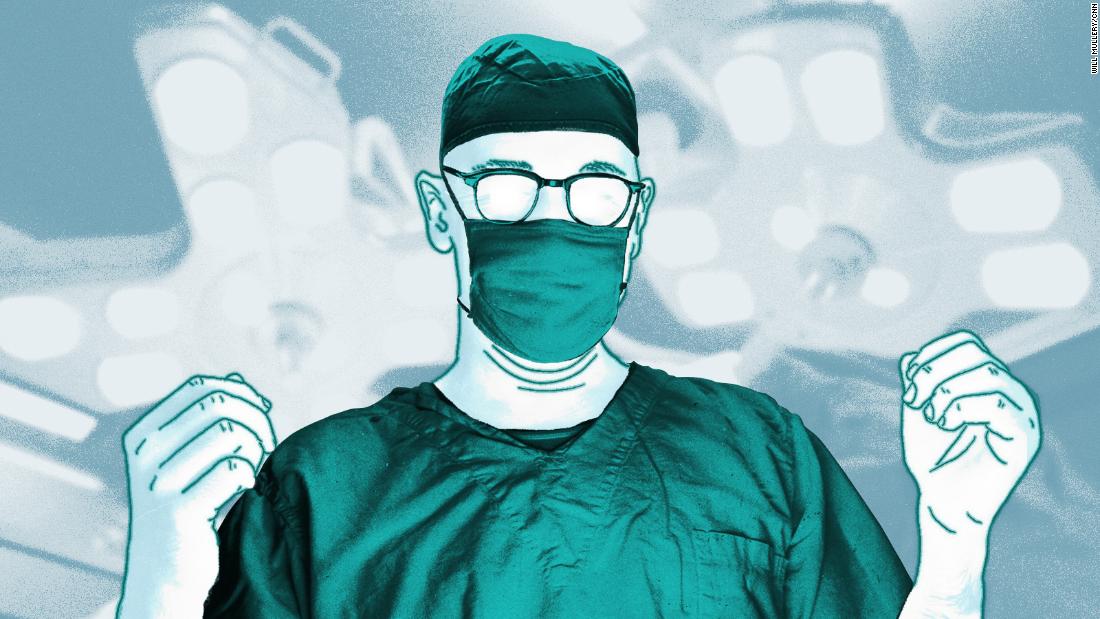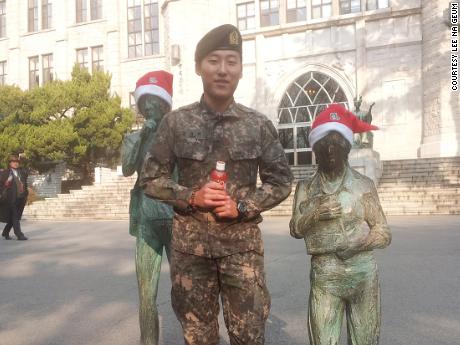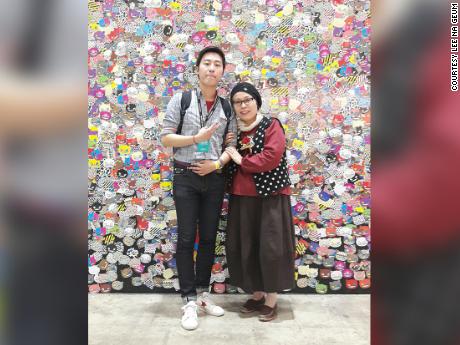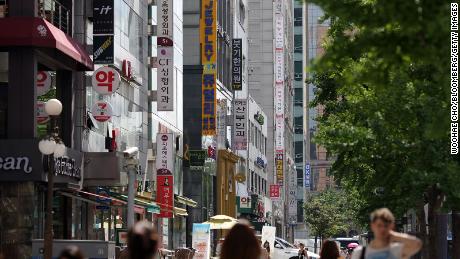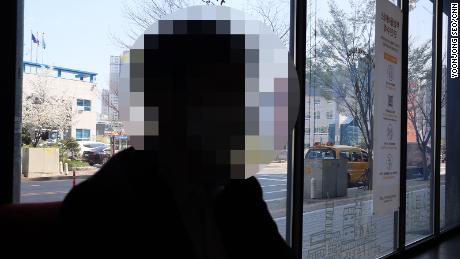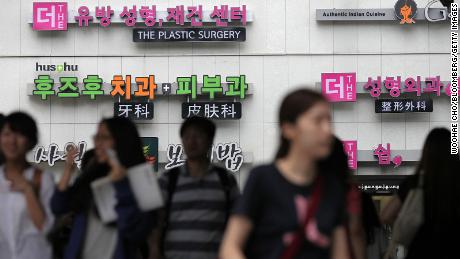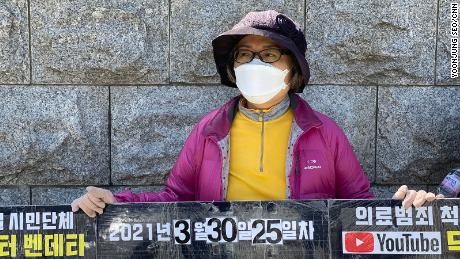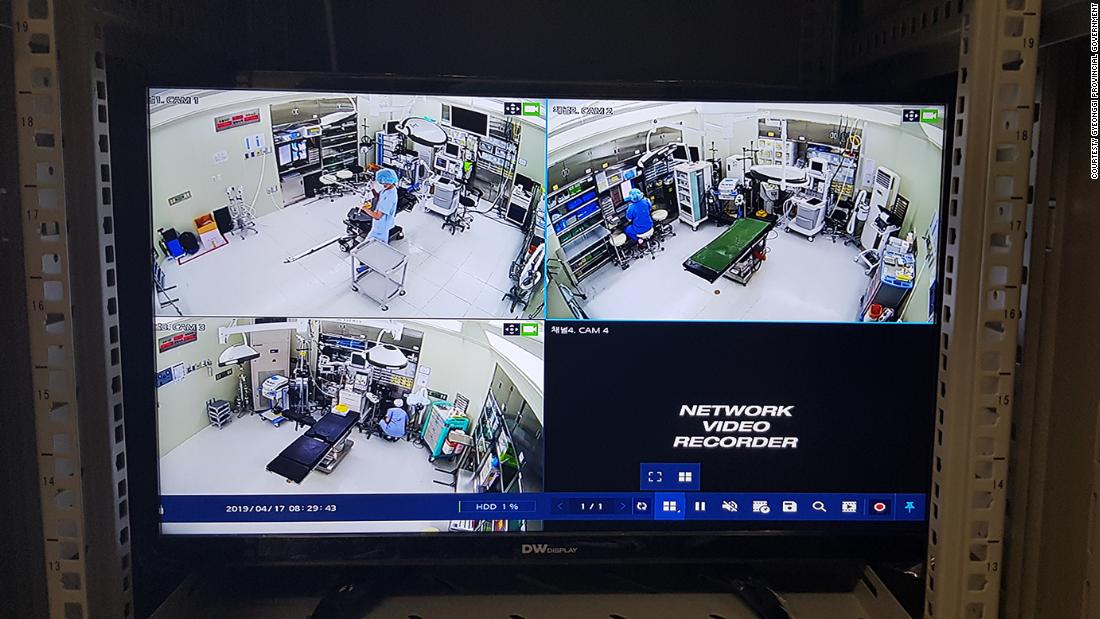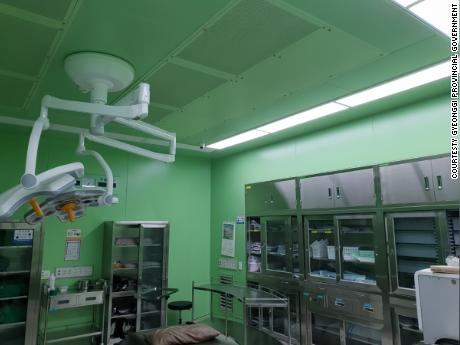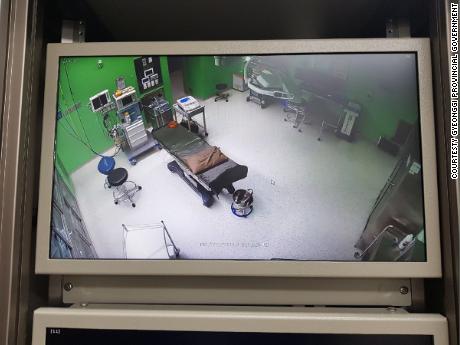“Are you the brother of Mr. Kwon Dae-hee?” the caller asked. “Your brother is in the ER. Could you come to (the hospital) now?”
His brother’s condition “wasn’t that serious,” the hospital said. Kwon assumed his brother had gotten into a fight after drinking, and, as he took a taxi to the Seoul hospital, he prepared to scold him for getting into trouble.
But he never got the chance. When Kwon arrived, the 24-year-old was unconscious. After having a surgery to make his jawline more slender, his brother had bled so much that the bandage around his face had turned red.
Kwon never made it. He died in hospital seven weeks later.
Kwon’s family say he was the victim of a “ghost doctor,” the name given to someone who performs a surgery another surgeon was hired for when the patient is under general anesthetic.
Under South Korean law, someone who orders or performs an unlicensed medical act is subject to a maximum punishment of five years in prison or a maximum fine of 50 million won ($44,000). If a ghost surgery is performed by a licensed doctor, that could lead to charges of causing harm or fraud. But these crimes are hard to prove — many substitute doctors don’t note down the work they’ve done and many clinics don’t have CCTV cameras. And even once the cases get to court, ghost doctors rarely get heavy penalties, which emboldens clinics to continue with the practice, lawyers say.
But Kwon’s high-profile case has brought renewed attention to shadowy operators. His family aren’t only bringing criminal charges against the doctors involved — they’re demanding legal changes, too.
Kwon’s story
Kwon was a warm and humble university student, the kind of son who cooked seaweed soup for his mother’s birthday, his family remembers. He was a high-achiever but was insecure about his looks and believed plastic surgery could make him more successful, his brother said.
In photos taken shortly before his death, Kwon had digitally altered his face to have the sort of pointy, V-like jaw seen on many K-pop idols.
Kwon’s elder brother and mother, Lee Na Geum, tried to talk him out of getting plastic surgery, but Kwon secretly booked into a well-known clinic that specialized in jawline surgeries in the glitzy Seoul neighborhood of Gangnam, an area traditionally home to the country’s biggest K-pop labels.
On September 8, 2016, a doctor removed bone to change the shape of Kwon’s jawline, a popular surgery in East Asia that usually takes one to two hours. It cost 6.5 million won ($5,766), according to his mother.
But Kwon’s operation did not go as planned.
After bleeding excessively, he was moved to hospital. At 9 a.m. the next morning, the plastic surgeon who had operated on Kwon arrived at the hospital. He told Kwon’s family that the procedure had gone as normal and even offered CCTV footage of the operating room to prove it — something that isn’t required nationwide, but which some clinics do to increase trust. “I immediately felt that I needed that evidence,” said Kwon’s mother, Lee.
Lee watched the CCTV footage from the operating room 500 times, she says. The footage showed the surgery started at 12:56 p.m. when the plastic surgeon began to cut Kwon’s jaw bone. Three nursing assistants were also in the room.
After an hour, the plastic surgeon left, and another doctor entered the operating room. The two entered and left the room, but for almost 30 minutes, there was no doctor in the operating room at all, although nursing assistants were present.
Lee saw that although the surgeon Kwon hired cut his jaw bones, he did not complete the surgery. Much of rest of the operation was done by the other doctor — a general doctor who did not have a plastic surgery license and who had recently graduated from medical school, despite an advertisement for the clinic explicitly saying that the head doctor of the clinic would operate from start to finish.
“My brother trusted in that main doctor, and that’s why he decided to be operated on there,” Kwon Tae-hoon said.
The surgery finally finished at 4:17 p.m., more than three hours after it started, according to the footage. Jaw surgery usually takes an hour-and-a-half or less for an experienced doctor, according to Kim Seon-woong, the former law director of the Korean Association of Plastic Surgeons, who has run a plastic surgery clinic for 25 years.
After the surgery, both Kwon’s doctors went home, leaving nurses in charge as he lost blood. Lee said she was shocked by the footage; as her son bled, assistants corrected their makeup or looked at their cellphones. In total, they mopped the bloody floor 13 times. When medical professionals evaluated the footage, they found he had likely lost three times as much blood as what the doctors had said.
“I don’t think this ghost doctor checked how much blood my son shed,” she added. “I was so angry at that fact. Had just one of the three doctors checked how much he bled,” she said, referring to the plastic surgeon, the ghost doctor and the anesthetist, “but no one did.”
Despite Kwon’s death, the clinic stayed open and continued to advertize that it had gone 14 years without a patient experiencing any accident. The clinic closed last year. It is unclear why.
A lack of laws
Kwon’s family wanted to hold those responsible to account. But they soon found the laws around ghost doctors were weak and incomplete.
One surgeon, who CNN agreed not to name as he feared that speaking out could prompt legal repercussions, said he began working at one of the country’s largest plastic surgeries in 2012. He no longer works there, but is speaking out because he doesn’t want to live with the guilt.
He said he was often asked to perform surgeries for the main doctor, and described how substitutes waited in a basement until they were called to operate on patients. These people were not listed as employees on the clinic’s website, and the clinic presented the surgeries as conducted by respected surgeons, he said.
Many of the face-shaping surgeries — like the one Kwon had — were performed by substitutes, mainly dentists, at the clinic where he worked, the surgeon said.
Jo Elfving-Hwang, an associate professor of Korean Studies at the University of Western Australia, said high-profile surgeons often use K-pop stars or celebrities to promote their clinic. But during busy periods, some can’t deal with the volume of patients, especially as star doctors also need to be available for consultations with new customers, said Elfving-Hwang.
“That’s where those instances have arisen,” she said.
Ghost doctors are a way for clinics to maximize profits by getting another doctor to cover the star practitioner — even if it’s not legal. “I guess the reason why this practice is around is because young and inexperienced doctors can get jobs and gain experience, and clinics can operate at a lower cost by hiring them to perform,” said the unnamed plastic surgeon. “In this way, clinics can take in more patients and conduct more surgeries.”
Patients may not be aware they have been operated on by a ghost doctor. Ghost doctors may not note their involvement in the surgery on medical charts, and many operating rooms don’t have cameras. That makes any charge difficult to prove, according to Park Ho-kyun, a lawyer representing Kwon’s family.
If victims are aware, they may be unwilling to come forward, as they may feel ashamed, Elfving-Hwang said. If victims do take legal cases, they often settle out of court, which means signing a confidentiality clause if they receive compensation, according to the unnamed plastic surgeon.
It’s unclear how many cases make it to court. But after cases are prosecuted in court, the Ministry of Health and Welfare can impose additional suspensions on doctors. A total of 28 administrative dispositions were imposed on doctors who ordered substituted surgery from 2015 to 2019, according to Ministry of Health and Welfare data provided by ruling party lawmaker Kwon Chil-seung’s office. Five lost their licenses, and the rest had their licenses temporarily suspended.
One doctor who asked a nurse to perform eyelid or nose plastic surgeries at least 90 times received only a three-month suspension, according to ruling party lawmaker Kwon Chil-seung’s office. Another doctor who ordered a medical device company employee and a nurse to perform at least 58 surgeries on spinal disc patients got a three-month suspension, the office added.
“There are ongoing efforts by lawmakers to strengthen the qualification of doctors by revising the medical law and the Health Ministry has agreed with the proposed bills,” Health Ministry senior deputy director Park Jae-woo told CNN this month. “Since ghost surgery or substituted surgery occurs secretly, it is very difficult to find out the statistics or the current situation.”
Despite all that, Kwon’s family was determined to seek justice. They launched a civil case against the clinic, accusing it of negligence for failing to explain the dangers of the surgery and failing to take proper measures to save its patient. In May 2019, the family won damages of $430 million Korean won ($381,000) — based on the assumption that if Kwon had lived, he would have worked until aged 65, earning the average manual worker’s income.
The three doctors involved in Kwon’s case are now facing criminal charges of manslaughter during the course of their work, two doctors and one nursing assistant face charges of an unlicensed medical act, and one doctor faces a charge of violating medical laws by exaggerating in an advertisement.
“Victims of medical accidents don’t want to file a lawsuit in general because they know how difficult and challenging it can be,” Kwon’s mother said. “But doctors know how hard it is to prove that something went wrong (due to a ghost doctor performing the surgery) so they openly tell victims to sue them. I heard this from many other victims I’ve met.”
Improving the rules
Most days, Kwon’s mother stands outside South Korea’s gray parliament building in Seoul. She’s become a high-profile advocate for change in the industry — she and her husband, who were retired, moved to Seoul after their son’s death to fight for justice.
Each day, she holds a sign demanding that authorities introduce a bill mandating CCTV in operation rooms — a bill that’s become known as the “Kwon Dae-hee bill.”
“I would not have been able to reveal the truth about (my son’s case) without the CCTV footage,” said his mother, Lee.
She also wants doctors to have their licenses permanently revoked if they commit certain crimes, such as murder or manslaughter.
There are others, too, who are working toward change, including several lawmakers who are pushing to get CCTV cameras installed in operating theaters.
In 2018, Gyeonggi province became the first to fit CCTV cameras in all government-run operating rooms, but governor Lee Jae-myung wants them in all hospitals and clinics nationwide — to prevent against ghost doctors, and stop other medical malpractice, including sexual assault under anesthetic.
“From the patient’s point of view, there is almost no evidence to prove negligence by the hospital even if a lawsuit is filed,” his office said in a statement. “Installing CCTV in the operating room can at least prevent inappropriate actions such as substituted surgery or sexual assault.”
Doctors are opposed to the bills, arguing they won’t be able to work as comfortably knowing they are being watched, and claiming that the cameras would erode trust with patients — not build it. The Korean Medical Association has publicly opposed the proposed bill mandating CCTV cameras, saying it is an invasion of privacy and could lead to doctors losing concentration during surgery.
At the March hearing, Choi Jae-hoon, a young man in his 20s, said he had followed Kwon’s case since hearing about it from Dr Vendetta’s YouTube channel. “This could be my own case, and that’s why I care about this case,” he said, explaining he was worried about medical malpractice in general medicine — not just plastic surgery.
Jeong Seoung-eun, who has been coming to court since February 2020 to support Kwon’s family, said: “I want to show my support so my country can become a better one by correcting faults in the (medical) system.”

